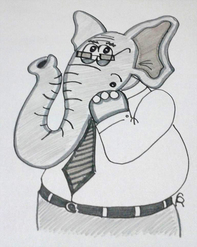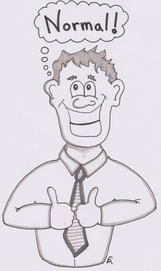 cartoon art by Craig Rohlfing
cartoon art by Craig Rohlfing When my son was small we were shopping at a hardware store. In the rear of the store, a buck’s head was mounted on the wall. My horrified four-year old asked, “Mommy, what’s that?”
Always one to believe simple truths are less confusing, I replied, “It’s an elk.”
“How did it get there?”
“Someone shot it, sweetie.”
“Oh,” he said.
Later, as we returned to our car, he asked if we could walk around to the back of the building.
“Why?” I asked.
“To see the back end of it.”
I have told that story many times. But once, at a dinner party, I couldn’t retrieve the name of the store. I don’t mean a specific name. I couldn’t remember what those types of stores are called!
This was years ago. Forgetting words was a new experience. After a long embarrassing pause, I began a description. “You know, those stores with hammers and screwdrivers…”
“Hardware store?” someone offered.
“Yes.” Relieved I resumed my story.
Since my chemo, I forget words regularly. When I can’t pull up a word, hardware store is my default utterance.
My oncologist seems unconcerned about my brain glitches. He says they are common after chemo, as is the fogginess and fatigue that make it impossible to resume my energizer bunny persona.
Friends, who have never had chemo, confide that their memory isn’t what it used to be. As we age, memory lapses are normal – forgetting names or where you left your glasses, missing an appointment or having trouble remembering the details of a conversation. But, in my cancer support group, this memory thing has a name - chemo brain. Before treatment, I’d never heard of it.
I had heard of the hippocampus, the region of the brain involved in the formation and retrieval of memories. I was curious how normal brain aging differs from chemo brain. So I attended a presentation by speech pathologists Carol Superfine, M.A., C.C.C. and Jeannette Nagai, M.A., C.C.C.
They described these frequently experienced post-chemo experiences:
· Being unusually disorganized
· Difficulty: concentrating, finding the right word, learning new skills and multitasking
· Fatigue, Mental fogginess
· Short attention span
· Short-term memory problems
· Taking longer than usual to complete routine tasks
· Trouble with verbal memory, such as remembering a conversation
· Trouble with visual memory, such as recalling an image or list of words
They termed these symptoms "mild cognitive impairment."
Usually the changes are very subtle, and others around us may not even notice. But we’re aware differences in our thinking.
Doctors have known for a long time that radiation therapy to the brain can cause trouble with thinking and memory. But now, they are learning that chemotherapy is linked to some of the same problems. Though the brain usually recovers over time, it’s important to know that the vague, distressing mental changes are not imagined. Chemo brain is real!
Two major studies are being conducted in Australia by oncologist Janette Vardy, MD. Her studies include people with breast cancer and colorectal cancer. The researcher has found that those with cancer who never received chemotherapy didn’t experience any brain changes. Those who had received chemotherapy did.
To try to understand better what is happening, the researchers tested the central nervous systems of experimental animals, Dr. Noble’s team found that chemotherapy interferes with the cell division in the hippocampus. (Remember what that is?) The cells needed for memory don’t reproduce normally. They also learned that the myelin, the nerve’s insulation can be damaged, causing cognitive problems.
Early research by Jame Abraham, MD, director of the Comprehensive Breast Cancer Program at West Virginia University’s Mary Babb Randolph Cancer Center shows differences in the white matter in the front part of the brain in women who had received chemotherapy—differences that correlate with their slower speed in processing information. These changes do not appear to be caused by depression or anxiety.
The last time I walked purposefully into my office and stood wondering what I was doing there, I thought, “Wow! This chemo brain is really annoying.” But then I remembered, so was my cancer.
So how do we deal with the inconvenient and sometimes aggravating aftermath of our changed bodies and minds? How do we cope with the new normal? Here’s another story I just remembered.
I think it’s easier to put things away – right away, rather than leave them lying around until later. The other day, I needed to tell my son to put something back where it belonged. “Could you put this away?” I pointed at the offending object.
I guess I was sounding a little bossy, because he shot back, “What’s this?”
Again I pointed, this time laughing, “I’m trying to think of the word. Would you put it away, anyway? Please.”
Here are a few suggestions on how to cope with day to day living:
· Share these changes in you with the people you love. They’ll be much more accommodating
· Talk with your cancer team. Write down your questions and bring them to your visit
· Relax. It helps you remember
· Have routines
· Write it down
· Move. Exercise increases the circulation to your brain
· Wait. Sometimes, your mind needs time to reboot
· Get enough rest and sleep. Naps can bring back alertness
· Eat healthfully, especially vegetables
· Give yourself permission to focus on one thing at a time
· Consider some time for meditation or yoga
· Don’t rush. Give yourself enough time
· Look for patterns that may help you figure out what affects your memory. Then, don't plan important tasks or events when your memory problems are worse
· Exercise your brain. Do or learn something new
· Don’t be hard on yourself. Acceptance will help you put your new thinking into perspective
· Describe it. If you lose a word, a name, ask for help.
· Don’t forget to laugh at yourself
· Don’t forget the Hardware Store
Helpful information and materials may be obtained from the American Cancer Society at 1-800-227-2345 or check out their Web site, www.cancer.org.

 RSS Feed
RSS Feed
